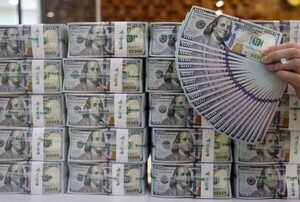

The amount of short-term foreign currency borrowings hastily acquired by banks alone has exceeded 4 trillion won. With the won-to-dollar exchange rate surpassing 1,400 won and reaching new highs, the risks associated with short-term foreign currency debts have also increased.
According to business disclosures on April 17, the average balance of foreign currency call money at the four major banks — KB Kookmin, Shinhan, Hana, and Woori Bank — amounted to 4.44 trillion won last year. This marked a 14.60 percent increase, or 633.4 billion won, compared to the previous year’s 3.70 trillion won.
A foreign currency call refers to short-term borrowings with maturities of less than 90 days. It’s a market where banks temporarily lend or borrow surplus funds. Such short-term foreign currency funds carry significant concerns about their ability to be withdrawn when there is high volatility in the international financial markets.
The bank with the largest increase in call money is Woori Bank. Woori Bank’s average balance of foreign currency call money last year amounted to 822.5 billion won, which is a 31.93 percent increase compared to the previous year’s 262.7 billion won. Shinhan Bank holds the largest amount of call money, with last year’s average balance reaching 1.33 trillion won. The figure surpasses that of Kookmin Bank’s 1.28 trillion won and Hana Bank’s 905.6 billion won.
The problem lies in the fact that short-term foreign currency liabilities like call money are increasing more rapidly than foreign currency assets. Looking at the maturity mismatch gap within 90 days, Shinhan Bank’s figure rose to 7.04 percent last year from 6.62 percent in the previous year, and Woori Bank’s also increased significantly to 6.78 percent last year from 4.64 percent in the previous year.
The foreign currency maturity mismatch gap refers to the difference between short-term external foreign currency liabilities and short-term external foreign currency assets. An increase in the maturity mismatch value indicates that foreign currency liabilities exceed foreign currency assets.
The concern arises from the sharp rise in the dollar, which could lead to increased foreign exchange trading losses. This situation occurs when there is a need to repay foreign currency debt at a higher exchange rate than when it was borrowed. In fact, foreign exchange trading losses at Hana Bank and Woori Bank increased by 233.5 billion won and 116.6 billion won, respectively, last year. At the end of last year, the total foreign exchange trading losses of the four major banks amounted to 14.93 trillion won.
The increase in short-term foreign currency liabilities also raises concerns about liquidity erosion. When there is a surge in the supply of short-term funds such as call money, the expected net outflow of funds increases, leading to a decline in liquidity indicators. In fact, the average foreign currency liquidity coverage ratio (LCR) of the four major banks in the fourth quarter of last year decreased by 10.59 percentage points to 147.65 percent compared to the end of October.
